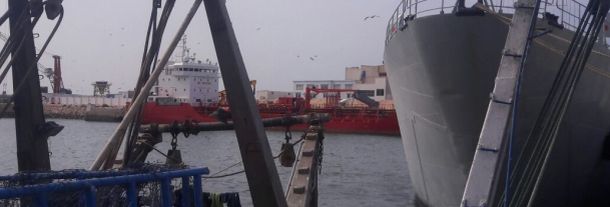
The Norwegian fish oil producer GC Rieber clarifies that their refinery Maromega in TanTan in South Morocco has stopped all purchases from Western Sahara.
The clarification from GC Rieber came as a reply to questions sent from the Norwegian Support Committee to the company on 21 April, 10 August and 16 December this year. The firm also explains that all its involvement in Western Sahara has stopped.
The reason for the Support Committee's request, was that GC Rieber stated to the Norwegian Broadcasting Corporation in April this year that they would assist its suppliers in Western Sahara to adapt to the new situation as they themselves would halt all Norwegian imports of fish oil. The Support Committee also asked what would happen with the purchases of Western Sahara fish that their firm in Tan Tan carried out.
Norway has been the leading importer of fish oil from Western Sahara for a decade. The trade stopped this year, as the magnitude of the unethical imports was revealed in Scandinavian media this spring. GC Rieber agreed to pay a 1,2 million Euro additional tax from the Norwegian government for declaring the Western Sahara fish as Moroccan upon imports, as Western Sahara is not part of the EFTA-Moroccan free trade agreement.
GC Rieber's imports to Norway until recently came from three sources :1) Western Sahara fish stocks, refined in and exported from El Aaiun 2) Western Sahara fish stocks refined in and exported from Tan Tan, Morocco and 3) Moroccan fish stocks refined and exported from Tan Tan.
The refinery in Tan Tan (photo above) is partially owned by GC Rieber, and has been involved in purchases from Western Sahara since the factory was established some 3-4 years ago. Now, the firm only imports fish oil from Morocco made from fish stocks caught in Morocco proper. Furthermore, GC Rieber clarifies that their Tan Tan refinery does not longer purchase fish from Western Sahara for exports to third countries.
In its letter of 22 December 2010, GC Rieber's Managing Director, Mr. Jan Roger Bjerkestrand, confirms to have "terminated the trade with fish oil with origin in Western Sahara". The reason was that their "biggest customer of fish oil from this territory canceled the contract".
"It is not correct that we still sell fish oil from Western Sahara to any customers in any countries. Our imports from this territory is from Morocco, and consists of fish which are caught by local fishermen in the city of Tantan, which is located in Morocco. Here we are also part owners in a refinery. Previously we also traded with factories in Laayoune in Western Sahara. This is not longer the case", Mr. Bjerkestrand stated.
Read the 3 letters from the Norwegian Support Committee to the firm here (in Norwegian):
21 April 2010
10 August 2010
15 December 2010
The Norwegian Support Committee for Western Sahara wanted to know which were the factories they imported from, what assistance GC Rieber would give to the producers in Western Sahara upon their phasing out of imports, and whether their refinery in Morocco would continue the purchases of Western Saharan fish even through the imports to Norway stopped.
Key Bay unloaded all cargo in Fécamp, France
A lighter Key Bay is on its way to Ghent, Belgium
Here is the Key Bay inside the port of Fécamp
Beautiful images of a vessel with an ugly cargo; fish oil taken illegally from an occupied land; the Key Bay in the port of Fécamp.


